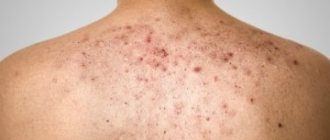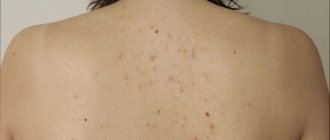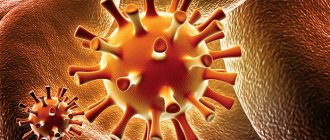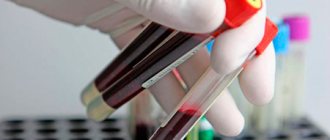Brief information about genital herpes
Genital herpes (in medical literature the abbreviation “GG”) is a complex of various diseases that are transmitted primarily through sexual contact. The disease is caused by HSV-2 viruses, less commonly – HSV-1 (herpes simplex viruses of the second and first types).
In the recent past, the pathology was considered harmless due to an erroneous understanding of the clinical picture. Doctors believed that the rash was the only sign of genital herpes. Only a few decades ago it became clear that the pathogen affects many internal human organs.
It has been established that these infections take part in the development of pathologies such as:
- inflammation of the cervix and its appendages in women;
- radiculitis;
- inflammation of the membranes of the brain.
It is impossible to destroy the virus in the body. Vaccines, serums and medications do not have a negative effect on the pathogen. Therefore, we can talk about lifelong carriage of herpes. Moreover, the peak detection of the disease occurs at 30-40 years of age, and by the age of 60, cases of diagnosis become more rare.
Immunity to herpes is not developed. The reason for this is unknown to doctors; it is believed that the virus is resistant to cells of the immune system due to a “built-in” mechanism for suppressing them.
Causes of the disease
Herpes is transmitted even with the slightest and short-term contact of the mucous membranes with the pathogen, so the likelihood of infection is very high. Statistics say that genital herpes is in second place in popularity throughout the world, only trichomoniasis could overtake it. Almost 90% of the entire population has the herpes virus. However, symptoms appear exclusively in every second infected person. If there is no certain factor, then the virus is in a “dormant” state.
The virus got its name because of its location, since a rash in the form of blisters appears in the intimate area, affects the skin and mucous membranes, and the process is accompanied by a burning sensation and unbearable itching. The disease is one of the most unpleasant because it significantly worsens the quality of life; it not only affects sexual relationships, but also causes psychological problems. An outbreak of the disease was recorded in the 70s of the twentieth century; genital herpes was noticed in men in America, and then in Europe. It was at that time that the sexual revolution occurred, oral sex became widespread, and during this process the virus was perfectly transmitted.
There are about eight types of herpes, the most dangerous and common are the following:
- cytomegalovirus;
- chicken pox;
- simple herpes of the first and second types;
- Epstein–Barr virus.
In our case, the disease is caused by a simple herpes virus (HSV), it comes in two types, and their clinical manifestations are very similar. Although there are also asymptomatic herpes, the virus is very difficult to diagnose. The causes of the disease may be the following factors:
- unprotected sexual intercourse with a person who is or once was a carrier of the disease;
- a large number of sexual partners;
- early onset of sexual intercourse;
- stress, fatigue, hypovitaminosis;
- poor nutrition;
- presence of other infections;
- use of intrauterine contraception;
- bad habits.
To a large extent, the causes of the disease are contacts with a sick person, as well as the presence of factors that reduce the body’s protective functions. There are several aspects that increase the likelihood of developing the disease:
- social class of the patient;
- age, it has been established that there are significantly more infected people aged 30-40 years;
- race. In Negroid people, herpes occurs in 45% of cases, and in Europeans this value is 17%.
If you are one of these risk factors, then you need to take increased safety measures and adhere to preventive measures. This will minimize the likelihood of developing the disease.
The main causes of herpes in men
The only cause of the disease is the HSV-1 and HSV-2 viruses. There are a number of factors that provoke infection or contribute to the widespread spread of the pathogen among the world's population. These include:
- Contact with a person who is a carrier of infection.
- The presence of homeostasis disorders (deviations in the functioning of the immune system) in the infected man.
- Decreased natural resistance as a result of stress, colds or other factors.
- Promiscuous sex life.
- Misconceptions about the safety of herpes for humans and lack of due diligence.
- Duration of latent flow.
- The likelihood of infection through contact or household contact (this is how herpes enters the child’s body).
According to clinical data, men become infected with genital herpes less often than women. There is an assumption that the reason for this is the large area of mucous membranes in women, and, accordingly, a wider “gate of infection”. However, it is impossible to say exactly why men become infected less often.
Clinical manifestations
The occurrence of herpes on the penis is accompanied by the appearance of various symptoms in the patient, which are both local and general in nature. On average, the incubation period of the disease lasts about 3-5 days, after which various symptoms of inguinal herpes appear successively.
A specific sign of this infectious disease is the appearance of a rash, represented by small blisters with transparent contents. As a rule, before the rash appears, the patient notices discomfort in the area of the glans penis, as well as slight redness of the mucous membrane.
The rash appears suddenly and may increase in size over time. 2-3 days after its element, the bubbles burst, leaving behind small ulcers. The mucosal defects become crusted over the next few days, which fall off without leaving any traces.
Herpetic infection is also characterized by various general symptoms, which are especially often observed with stage 2 herpes, when the patient has an intoxication syndrome. Common manifestations include:
- increase in body temperature to 37.5-38°C;
- feeling of weakness, general weakness;
- increased drowsiness;
- enlarged lymph nodes with herpes in the groin;
- pain in joints, muscles;
- irritability, etc.
If any symptoms of herpes on the penis occur, a man should immediately contact a medical facility for proper diagnosis and selection of individual therapy.
Symptoms of genital herpes in men and boys
The clinical picture of genital herpes is quite multifaceted. It directly depends on the course of the disease and may have no symptoms at all.
There are 6 known types of the disease, each of which has its own symptoms.
- Primary infection - most often occurs through contact of the genitals during sex.
- Secondary infection occurs when the pathogen enters the body a second time.
- Relapse of HS - the pathogen is constantly in the body and periodically “makes itself felt.”
- Atypical course - detected in the laboratory, the virus “masks” as other diseases.
- Latent course - more common in men, there are no signs of infection.
Treatment options
Any specialist can visually identify the disease, because it has characteristic features. Treatment of genital herpes in men is carried out only after a clinical examination in a hospital. Additionally, the urethra is diagnosed using urethrocystoscopy and analysis of tissue affected by ulcers.
The main medications for the treatment of herpes are ointments, so the affected area must be treated with special medications twice a day
Drug treatment
The process of treating herpes on the penis is greatly facilitated if it was started in the initial stages of the development of the disease. The following drugs have proven themselves to be effective in the fight against the virus:
- "Zovirax".
- "Valacyclovir."
- "Gerpevir".
- Famciclovir.
- "Acyclovir".
The main component of Zovirax ointment is acyclovir. This synthetic ingredient is similar in structure to guanine; it exhibits high activity in the fight against herpes viruses type I and II
If necessary, the doctor will also prescribe tablet medications (the same “Acyclovir”, etc.)
ethnoscience
You can combine traditional methods of treatment with traditional methods - this will allow you to achieve quick and effective results. Traditional medicine not only copes with the virus, but also improves immunity. There are many recipes that reduce pain and cope with itching. And although you won’t be able to completely get rid of the virus, you can minimize its manifestations.
- Arnica flowers (15 g) are poured with boiling water (0.5 l) and infused for 1.5-2 hours. This tincture can be used for compresses.
- Cold compresses work well for pain relief. To do this, you can use gauze soaked in cold water.
- Crushed celandine herb (50 g) must be mixed with natural honey (50 g). This mixture should be lubricated on the affected areas of the body.
- Violet can strengthen the immune system and weaken the virus. Taking a bath with violet elixir improves health and allows you to cope with many diseases.
- A mixture of green onions and olive oil compensates for the lack of vitamins C and A.
- You can make an excellent tincture from capsicum and horseradish root. These two components should be passed through a meat grinder and the jar should be filled halfway. The remaining half is filled with vodka. Next, the product should stand for two weeks in a dark place, it should be systematically checked and mixed. After this period, you can strain the mixture and drink 1 tbsp twice a day. l. before meals.
Nutrition
To speed up the healing process, you should remove some foods from your diet and add others:
- You need to remove chocolate, almonds, caffeine, nuts, wheat, rice, and corn from the menu.
- Lysine is found in vegetables, brewer's yeast, meat, legumes, seafood and eggs - they should be consumed daily. You can diversify your diet with yogurt, cheese and butter. These products will help you cope with the disease faster, this is especially true during the period of greatest exacerbation.
- Try to minimize consumption of flour and sugar, as well as processed foods, as they negatively affect the immune system and can trigger the re-development of herpes in the intimate area.
Seafood, meat and eggs are the main sources of lysine necessary to fight the virus
Remember. To effectively treat herpes on the head in men, it is necessary to eat rationally and follow a diet. The goal is to minimize arginine intake and increase the amount of lysine in the body.
Genital herpes is a very unpleasant virus that is chronic. The best prevention of herpes on the head of the penis is the absence of promiscuity and the use of a condom. Plus, you should follow the rules of personal hygiene, lead an active lifestyle and constantly try to increase the protective functions of the immune system.
Diagnosis of genital herpes
The relationship between various diseases and the herpes virus is revealed only after a series of diagnostic measures. It is impossible to make an accurate diagnosis based on complaints alone, therefore the following methods are currently used to identify HS:
- PCR diagnostics – allows you to detect traces of the virus in tissues;
- ELISA or ELISA;
- detection of antigens to HSV-2 using modern tests.
The accuracy of these research methods can reach 95%, and the period for obtaining test results is 1-2 days. However, there may be cases when even the results of laboratory tests cannot accurately make a diagnosis. This is especially true for HSV-1, whose role in the development of genital herpes increases every year.
What tests need to be done to make a diagnosis?
Since herpes on the penis has symptoms characteristic of some other sexually transmitted diseases, a visual examination by a specialist alone will not be enough. For diagnosis, you should contact a urologist or dermatovenerologist.
To make a diagnosis you need:
- Enzyme-linked immunosorbent assay (ELISA)
- Polymerase chain reaction (PCR)
PCR of body fluid allows you to find the genetic material of the virus in the body. This gives a 100% result of its determination by DNA. Using ELISA, antibodies G and M are detected, the appearance of which in the blood is due to the functioning of the immune system.
Complications and prognosis
With improper treatment or lack thereof, there is a risk of developing serious complications. The virus can penetrate other organs and cause various diseases:
- prostatitis;
- nervous disorders;
- conjunctivitis, etc.
It has been established that the herpes virus increases the risk of developing various tumors, including cancer.
The prognosis for repeated outbreaks of HS in a man depends on the condition of his body, lifestyle and age.
Symptoms and clinical picture of the disease
Depending on the type of viral infection, the incubation period can last from 3 to 14 days. During incubation, the virus accumulates and multiplies at the site of introduction. The full picture of the disease unfolds after the virus has completely penetrated the human blood. For proper treatment of the disease, it is important to know the main symptoms of genital herpes in men.
Herpes in the intimate area in men manifests itself like any herpes rash - in the form of translucent blisters with a cloudy liquid inside. In this case, the entire area in the groin can be affected - the head of the penis, pubis, testicles, and shaft of the penis. Sometimes the virus also affects a wider area - the area inside the thighs, buttocks, abdomen.
The onset of the disease is characterized by the following signs of genital herpes in men:
- redness of the infected area (most often with herpes on the head of the penis or on the foreskin);
- burning;
- itching;
- pain;
- slight swelling (glans penis, scrotum).
After some time, small bubbles appear on the skin, in the groin area, filled with a cloudy liquid - infiltrate. When a blistering rash appears, the following symptoms of herpes in men are observed:
- malaise;
- headaches and joint pain;
- temperature;
- gastrointestinal disorders;
- discharge of pus from the urethra;
- enlarged inguinal lymph nodes.
This symptomatology is typical for primary infection with herpes type 2; the secondary disease is practically asymptomatic.
The blisters persist for 4-5 days, then burst and turn into weeping wounds. The healing of such wounds and ulcers, especially if the herpes is on the head of the penis, is complicated by the constant rubbing of the genitals on underwear and washing the genitals. If therapeutic measures and hygiene are not observed, the ulcers can become inflamed and filled with pus. Wound healing and crust formation occurs within 5-7 days. Then the crusts fall off on their own, leaving no scars or pigment spots on the skin.
Sometimes genital herpes in men occurs in an atypical form - there are no rashes in the clinical picture, but there are symptoms characteristic of other genitourinary infections: itching, burning, pain in the penis, purulent discharge from the urethra. In such cases, it is difficult to diagnose the disease, and herpes becomes chronic.
Important! After an infection, the herpes virus does not leave the human body, but accumulates in the nerve ganglia and waits for the body to weaken in order to disturb the person again.
In cases of relapse, herpes on the genital organs in men practically does not manifest itself at all: the rash is insignificant, and catarrhal phenomena are not observed. A man may not notice recurrent herpes, and may learn about the disease from an infected sexual partner. Therefore, at the first slightest sign of herpes on the pubis or penis, you need to consult a specialist.
Sex with genital herpes
Genital herpes is transmitted sexually. A man can be a source of infection for a woman, or vice versa - he can become infected from her, depending on who is the carrier. Therefore, if a doctor diagnoses “genital herpes in the active phase,” sexual contact should be excluded.
Common myths and misconceptions about sex with herpes:
- The condom provides 100% protection. In fact, infection can occur through the skin of the hands or contact with the body of the patient.
- There are drugs that kill the virus. In fact, various sprays and gels do not provide a guarantee of protection and kill virus cells only at the stage of their division.
- You can be treated with Miramistin. Miramistin can act as a prophylactic agent, but it does not give 100% results.
If a man’s herpes is in remission, then intimate life is possible, but with one sexual partner. Promiscuous sexual intercourse in this case can aggravate the development of the disease.
Prevention
The best means of protection against infection with genital herpes remains contraception. A condom can protect both a man from a sick woman and vice versa. The method may not be very effective only when the disease is at an acute stage; during this period it is better to abstain from sexual intercourse; it can lead not only to infection of the other partner, but also to infection of existing ulcers.
Another important point is to avoid oral sex during the period of the presence of herpes on the lips of the first type, as it can spread to the groin.
The vaccine against the pathology is currently at the stage of laboratory research.
Remember, maintaining good personal hygiene and avoiding unprotected sex will be the best methods for preventing the simple herpes virus. Be healthy!
Measures to prevent genital herpes
Vaccination against HH can be considered a means of prevention, however, due to the characteristics of the virus, this measure does not provide a lasting effect. Immunity against herpes is weakly developed, and there is always a risk of infection.
Even vaccinated people should adhere to the following rules:
- lead a healthy lifestyle, get rid of bad habits;
- exclude multiple sexual relations;
- use a condom to reduce the risk of infection.
The best measure to prevent genital herpes in men is to promptly consult a doctor after casual sexual contact to get tested and prescribe a preventative treatment regimen. Only in this case can we talk about a high chance of not getting infected.
Diagnostics
The main method of diagnosis is an external examination of the body by a specialist. The presence of rashes indicates that there can be no mistakes during the examination. The examination can be carried out by an andrologist, venereologist, therapist or dermatologist. The doctor examines the scrotum, glans, and penis for inflammation or blisters. A special brush removes mucus from the urinary tract. This procedure does not cause pain, but urination itself can cause sharp pain.
There are cases when the blistering rash even spreads to the anus, which will require not only a visual examination of the anus, but also analysis of a rectal sample. For examination, the doctor can use a rectoscope; it will allow you to check the walls of the rectum for cracks, as well as vesicles. In the best case, herpes must be diagnosed even before visual signs, at the stage when itching, high fever and nagging pain appear. Diagnostic measures include not only an external examination; it is important to supplement it with more accurate research methods:
- immunoenzyme analysis, this method refers to serological methods, it allows you to determine the amount of antibodies in the body that resist herpes;
- polymerase reaction, for research you need to take a sample of mucus and blood, in which herpes DNA is found;
- cultural method, it allows you to determine herpes by reproduction under special conditions.
The first symptoms of the virus are very similar to other infections, so identifying the disease without special diagnostics is very difficult. Symptoms of the disease should force a man to go to a medical facility, but, as a rule, this happens very rarely due to embarrassment or banal fear of doctors. This is what you need to do if genital herpes occurs in men; you should pay attention to the symptoms immediately!
First symptoms
The clinical picture, as already mentioned, develops 1–3 weeks after the pathogen enters the body. Typical first manifestations include:
- Intense rashes in the penis area. It all starts with the appearance of a small red spot. It is dense to the touch, does not itch and does not bother the patient in any way. After 1–3 days, a dense blister with a diameter of 1–5 mm appears at the site of the rash. It looks like a mushroom or a dome, dense to the touch, filled with transparent exudate, which consists of dead herpetic pathogens, leukocytes and intercellular fluid. The blister resolves on its own after 1–2 weeks with the formation of a scar. The rashes are localized on the glans penis, scrotum, testicles and tend to spread quickly, covering larger and larger areas of the skin. In advanced cases, the entire intimate area may be affected, including the lower abdomen, pubis, and buttocks. A generalized rash over the entire body is possible. This symptom is pathognomonic for genital herpes.
- Genital herpes in men is characterized by pain in the area of the rash. The pain is burning, aching, and intensifies with physical activity.
- A typical symptom of a herpetic pathogen on the penis is pain when urinating. This is an unfavorable sign indicating infection of the urethra. If treatment is not started, the infection will spread upward, involving the bladder, prostate, and kidneys .
- Hyperthermia. There is an increase in body temperature. Since this is the very first symptom, in the early stages of the formation of the disease it is difficult to distinguish herpes on the penis from a common cold.
- Impaired potency, pain when urinating. Atypical signs characteristic of late untreated herpes. Indicate damage to the prostate gland in a man.
The male body is no less fragile structure when compared with the female one. The symptoms are specific enough to make an accurate diagnosis. However, you should not self-diagnose.











